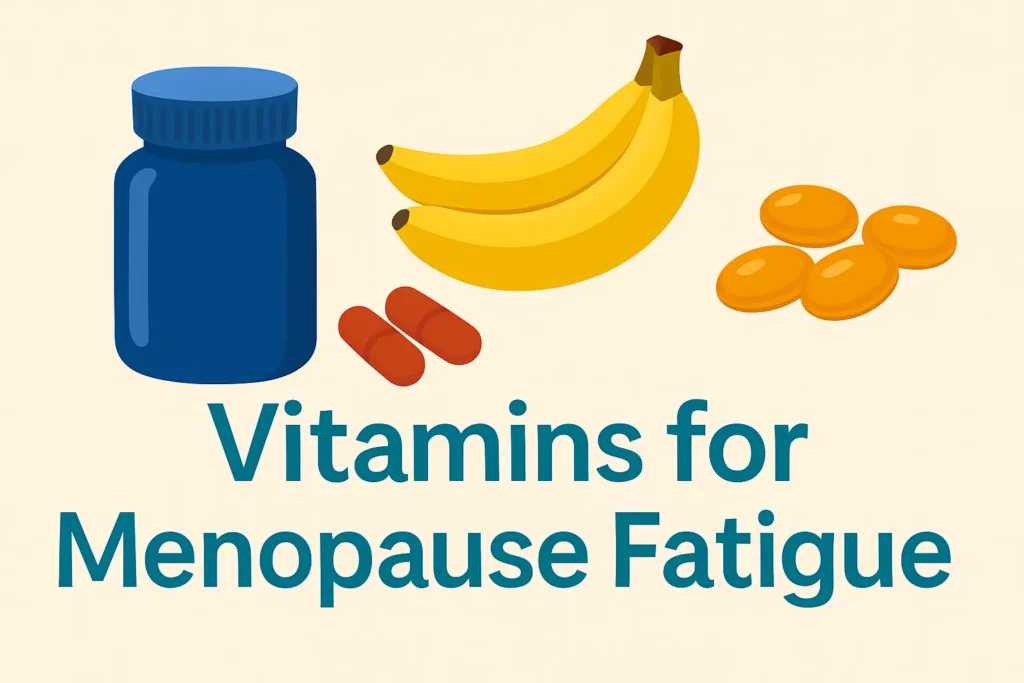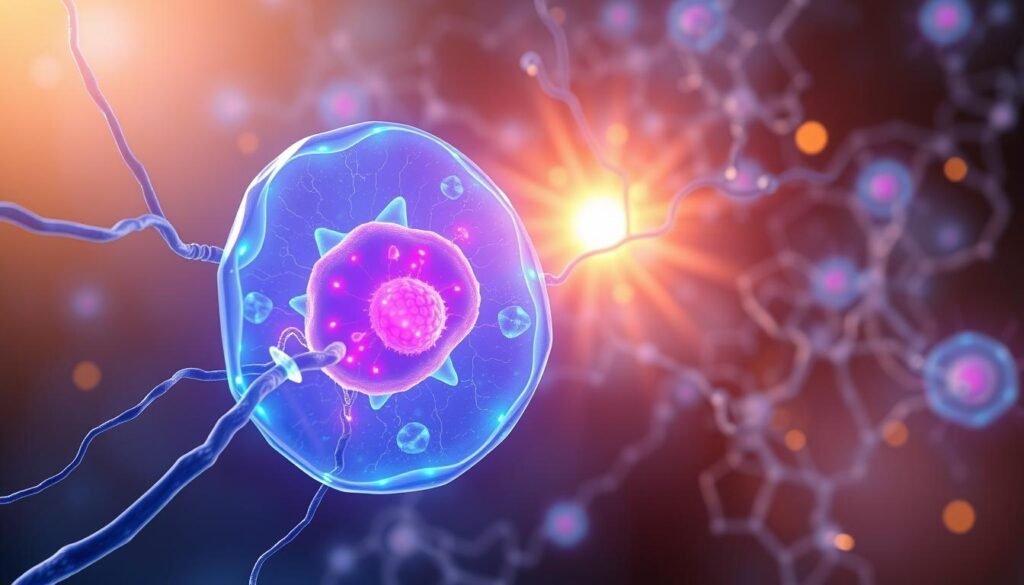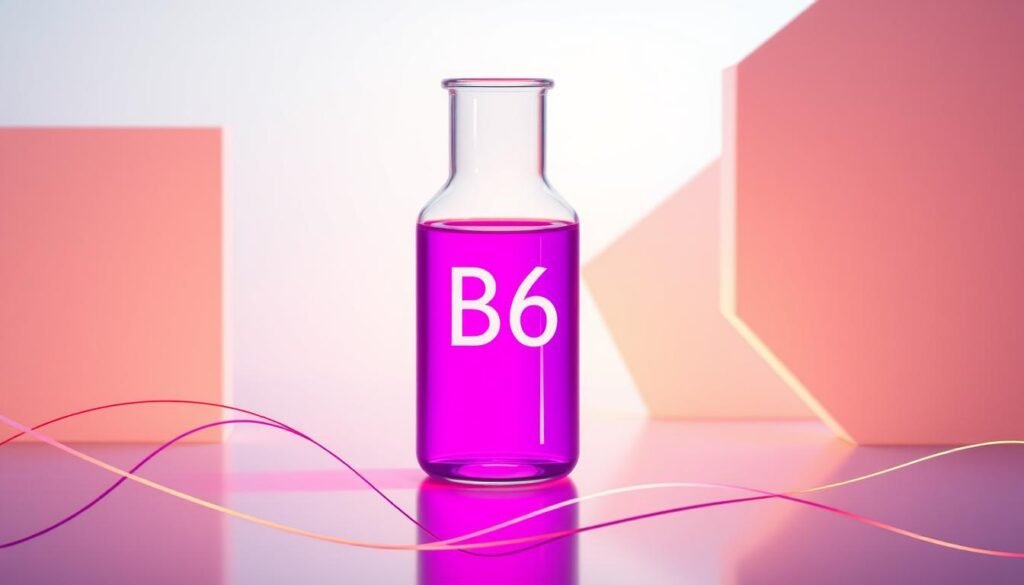Did you know nearly 80% of women feel tired during menopause? This tiredness affects their life quality a lot. Hormonal changes, sleep issues, and lifestyle play big roles in this.
Effective menopause management is more than just treating symptoms. It’s about caring for your whole health. Vitamins like D, E, and B vitamins help boost your energy and health. Adding these to your daily routine might help fight menopause fatigue.
Exploring the best vitamins for menopause fatigue shows how they can boost your energy and health. By choosing the right foods and supplements, you can control your energy. This makes menopause easier to handle.

The Menopause-Fatigue Connection: Why Your Energy Levels Drop
Fatigue during menopause is more than just feeling tired. It’s a mix of hormonal, lifestyle, and physical factors. Knowing why you’re so tired is key to feeling better.
Hormonal Fluctuations and Energy Depletion
Estrogen levels dropping during menopause affects your energy. Estrogen helps control your body’s functions, including energy. When estrogen goes down, you might feel less energetic.
The hormonal changes in menopause can cause:
- Disrupted sleep due to hot flashes and night sweats
- Changes in how your body uses energy
- More stress
Common Energy Zappers During Menopause
Other things can also make you feel tired during menopause. These include:
- Sleep Disturbances: Hot flashes, night sweats, and insomnia can make you very tired.
- Lifestyle Factors: Stress, not moving enough, and bad eating habits can make you feel more tired.
- Mood Changes: Feeling anxious or depressed, common in menopause, can also make you feel drained.
Knowing what causes menopause fatigue is the first step to feeling better. By tackling hormonal changes and lifestyle issues, you can start to feel more energetic and live better.
How Vitamins and Minerals Combat Menopause Fatigue
Vitamins and minerals are key in fighting menopause fatigue. Menopause brings big changes, like hormone level shifts, which can make you tired. Knowing how they help with energy and health can help manage this symptom better.
Nutritional Deficiencies Common in Menopausal Women
Menopause often leads to nutritional gaps. This is due to changes in how the body uses food and its need for nutrients. Vitamin D deficiency is common, affecting bones and mood. Vitamin B complex, including B6, B9, and B12, is also often low, as it’s key for energy.
Magnesium is another important mineral. It helps with energy and muscle work. Many women in menopause don’t get enough, making fatigue worse.
The Science Behind Vitamins and Hormonal Balance
Vitamins and minerals are linked to hormonal balance. Vitamins like D and B complex are vital for energy and hormone health. For example, vitamin B6 helps with mood, which is helpful during menopause’s mood swings.
Dr. Lisa Mosconi says, “The right nutrition can really help with menopause symptoms, like tiredness.” This shows how important a balanced diet is.
Vitamins C and E also help by fighting cell damage and inflammation. These can cause fatigue and other symptoms. Getting enough of these vitamins can help with menopause’s challenges.
Vitamin D: The Sunshine Nutrient for Menopausal Vitality
Vitamin D is called the “sunshine vitamin.” It’s key for staying healthy during menopause. As women get older, their bodies change a lot. This can affect their bones and energy.
Impact on Energy and Mood
Vitamin D helps a lot with energy and mood. Studies show it can fight off tiredness. It might also help with feelings of sadness and worry that come with menopause.
Key benefits of vitamin D for energy and mood include:
- Regulation of energy production within cells
- Support for neurotransmitter function, which influences mood
- Potential reduction in symptoms of depression and anxiety
Bone Health During Estrogen Decline
Vitamin D is very important for bones, even more so during menopause. Estrogen helps keep bones strong. When estrogen goes down, bones can weaken. Vitamin D helps the body use calcium, which is vital for bones.
The importance of vitamin D for bone health includes:
- Enhancing calcium absorption
- Supporting bone mineralization
- Reducing the risk of osteoporosis and fractures

Optimal Sources and Dosage
Getting enough vitamin D is important. You can get it from the sun, food, and supplements. Sunlight helps make vitamin D in your skin. But, food and supplements are also key, more so in winter or if you don’t get much sun.
| Source | Description | Recommended Intake |
|---|---|---|
| Sunlight | Exposure to UVB rays triggers vitamin D production | 10-15 minutes, 2-3 times a week |
| Food | Fatty fish, fortified dairy products, and cereals | Include in daily diet |
| Supplements | Vitamin D3 supplements | 1,000-2,000 IU per day, consult a healthcare provider |
Always talk to a doctor to find out how much vitamin D you need. This is very important during menopause.
Vitamin B12: Your Cellular Energy Powerhouse
Vitamin B12 is key for keeping energy up, mainly during menopause. Women often feel tired during this time. This can really affect their life quality.

Fueling Mitochondrial Function and Energy Production
Vitamin B12 helps make red blood cells and keeps the nervous system working. It’s also needed for breaking down fatty acids and amino acids. These are important for energy production.
The mitochondria, or cell powerhouses, need Vitamin B12 to work well. This ensures your body gets the energy it needs.
Vitamin B12 fights fatigue, a big problem during menopause. It helps make ATP, the energy source for cells.
Recognizing B12 Deficiency During Menopause
A lack of Vitamin B12 makes menopause symptoms worse. These include tiredness, weakness, and nerve problems. It’s important to know the signs of a deficiency.
- Fatigue and weakness
- Numbness or tingling in hands and feet
- Difficulty walking
- Mood changes, such as depression
If you’re feeling these symptoms, see a doctor. They can help figure out what to do next.
Food Sources and Supplement Considerations
You can get Vitamin B12 from certain foods. These include:
- Animal products like meat, fish, and poultry
- Dairy products and eggs
- Fortified plant-based milk and cereals
If you can’t get enough from food, supplements might help. But talk to a doctor first. They can tell you the right amount and type to take.
Vitamin B6: Balancing Hormones and Boosting Mood
Vitamin B6 is key in balancing hormones and improving mood during menopause. It helps with many body functions that affect your health.

B6’s Role in Neurotransmitter Synthesis
Vitamin B6 is important for making neurotransmitters like serotonin and dopamine. These help control mood. Serotonin helps fight depression, and dopamine is linked to happiness. Vitamin B6 helps make these, easing mood swings and emotional issues in menopause.
“Vitamin B6 is directly involved in the synthesis of neurotransmitters that regulate mood, making it a valuable nutrient for managing menopausal symptoms,” says a study on nutritional interventions during menopause.
Managing Depression and Mood Swings Naturally
Hormone changes in menopause can cause mood swings and depression. Vitamin B6 helps by supporting neurotransmitter production and keeping brain chemistry balanced. Eating foods rich in vitamin B6 or taking supplements can help fight these symptoms.
- Reduces symptoms of depression
- Helps manage mood swings
- Supports overall brain health
Dietary Sources and Safe Supplementation
You can find vitamin B6 in foods like chicken, fish, potatoes, and non-citrus fruits. Eating these foods helps you get enough vitamin B6. If you need more, talk to a doctor about supplements. It’s important to get advice on safe amounts.
Knowing how vitamin B6 affects hormones and mood helps you manage menopause better. It improves your life quality.
Vitamin E: Antioxidant Protection During Hormonal Transition
Vitamin E is key for protecting your body during menopause. It acts as an antioxidant. This means it fights off free radicals that can age your cells and make menopause symptoms worse.

Fighting Oxidative Stress and Inflammation
Oxidative stress happens when free radicals outnumber antioxidants in your body. This imbalance can cause inflammation, making symptoms worse. Vitamin E’s antioxidant properties help balance this, reducing inflammation and improving health.
Eating foods rich in vitamin E or taking supplements can strengthen your body. This can boost your energy and lessen menopause symptoms.
Relief from Hot Flashes and Night Sweats
Hot flashes and night sweats are common and upsetting symptoms of menopause. Studies show that vitamin E may help ease these issues. Vitamin E’s antioxidants might help lessen how often and how bad these symptoms are.
Along with vitamin E, a healthy lifestyle is important. Eating well and exercising regularly can also help manage these symptoms.
Natural Food Sources and Supplement Guidelines
You can find vitamin E in foods like nuts, seeds, oils, and leafy greens. Almonds, sunflower seeds, and spinach are great sources. Adding these to your diet can increase your vitamin E levels.
If you’re thinking about supplements, talk to your doctor first. They can guide you to the right supplement and dosage for you.
Vitamin C: Immune Support and Collagen Enhancement
Vitamin C is a key nutrient that boosts the immune system and helps make collagen. It’s very important for women going through menopause. Knowing how vitamin C helps can guide women in taking care of their health.
Boosting Energy with Vitamin C
Vitamin C is key for making energy in our cells. During menopause, women might feel tired because of less estrogen. Vitamin C helps fight this tiredness by boosting energy.
It also helps our body use iron better. Iron is needed to carry oxygen to our cells. This is another way vitamin C helps us feel more energetic.
Some key energy-boosting benefits of vitamin C include:
- Enhancing mitochondrial function for improved energy production
- Supporting iron absorption to combat iron deficiency anemia
- Reducing oxidative stress, which can contribute to fatigue
Skin and Joint Health Benefits
Menopause can affect skin and joints. Vitamin C is important for making collagen. Collagen keeps our skin, bones, and joints strong.
Vitamin C helps make collagen better. This is good for our skin and joints. It makes our skin look better and keeps our joints healthy.
Benefits of vitamin C for skin and joint health include:
| Benefit | Description |
|---|---|
| Improved skin elasticity | Vitamin C supports collagen production, making skin look better and smoother. |
| Joint health support | Vitamin C helps keep joints healthy and may prevent osteoarthritis. |
| Wound healing | Vitamin C is important for healing wounds and repairing tissues. |
Optimal Forms and Timing for Vitamin C Absorption
To get the most from vitamin C, choose the right form and time to take it. Eating foods high in vitamin C like citrus fruits is great. For supplements, ascorbic acid and sodium ascorbate are good choices. Sodium ascorbate is easier on the stomach.
Here’s how to take vitamin C supplements:
- Take it with meals to help your body absorb it better.
- Split your daily dose into smaller amounts to keep energy up all day.
- Watch how much you take to avoid stomach problems from too much vitamin C.
Magnesium and Iron: Critical Minerals for Fighting Fatigue
Magnesium and iron are key minerals for energy during menopause. They help with many body functions that keep you feeling alive.
Impact on Sleep Quality and Energy
Magnesium helps you sleep better, which is often hard during menopause. It relaxes your muscles and calms your mind. A good night’s sleep is key to feeling energized, and magnesium can help a lot.
A study in the Journal of Research in Medical Sciences showed magnesium helps sleep in menopausal women. Getting enough magnesium can lead to better sleep and more energy.
Iron Deficiency: A Hidden Cause of Fatigue
Iron deficiency can cause fatigue because it’s needed for red blood cells. These cells carry oxygen, which is vital for energy. During menopause, iron deficiency can worsen tiredness.
Look out for signs of iron deficiency like pale skin and shortness of breath. If you notice these, see a doctor for help.
Dietary Sources and Supplementation
Eating foods rich in magnesium and iron can fight fatigue. Dark leafy greens, nuts, and whole grains are good for magnesium. Iron is found in red meat, poultry, fish, and fortified cereals. Supplements might be needed if you’re really low.
Always talk to a doctor before taking supplements. They can check your mineral levels and suggest the right diet or supplements for you.
Creating Your Personalized Vitamins for Menopause Fatigue Regimen
To fight menopause fatigue, you need a plan that’s just for you. This means knowing what nutrients you need and making a diet and supplement plan that fits you.
Designing a Nutrient-Dense Diet for Menopause
Eating a balanced diet is key to beating menopause fatigue. Eat lots of:
- Fruits and veggies full of antioxidants
- Whole grains for energy
- Lean proteins for hormone balance
- Healthy fats for brain and hormone health
Adding these foods to your diet can help fight fatigue and keep you healthy during menopause.
Supplement Timing and Synergistic Combinations
Timing and mixing supplements is important. Some vitamins and minerals work better together. For instance:
- Vitamin D and magnesium help bones
- Iron and vitamin C boost iron absorption
- B vitamins help make energy
Knowing how these work together can make your supplements more effective.
When to Seek Professional Guidance
Even with a good diet and supplements, sometimes you need a doctor’s help. See a healthcare provider if:
- You’re really tired and can’t shake it
- You’re worried about your diet or supplements
- You’re thinking about changing your supplements a lot
A doctor can give you advice that’s just right for you and your health.
By being proactive and informed about your diet and supplements, you can manage menopause fatigue. This will help you live a better life.
Conclusion: Embracing Vitality Through Nutritional Support
Nutritional support is key in fighting menopause fatigue. It helps manage this tough symptom. By knowing how vitamins and minerals affect hormones, you can boost your energy.
Vitamins D, B12, B6, E, and C, along with minerals like magnesium and iron, are important. They help fight fatigue and keep hormones balanced. Adding these to your diet and supplements can improve your life quality.
With a diet rich in nutrients and the right supplements, you can beat menopause fatigue. This lets you live a more vibrant and energetic life. Focus on your nutrition to stay full of life during this big change.
FAQs
What are the best vitamins to take for menopause fatigue?
Vitamins B, C, D, and E are great for menopause fatigue. Vitamin B complex and B12 help make energy. Vitamin E is an antioxidant, and vitamin C boosts the immune system and collagen.
How does vitamin D help with menopause symptoms?
Vitamin D keeps bones strong when estrogen levels drop. It may also help with mood and energy, easing menopause symptoms.
Can vitamin B12 deficiency cause fatigue during menopause?
Yes, not enough vitamin B12 can cause fatigue and weakness. It’s key for menopausal women to get enough through food or supplements.
How does vitamin B6 support hormone balance during menopause?
Vitamin B6 helps make neurotransmitters. This can help with mood swings and depression caused by hormonal changes in menopause.
What is the role of vitamin E in alleviating hot flashes and night sweats?
Vitamin E’s antioxidants may reduce stress and inflammation. This could help with hot flashes and night sweats during menopause.
How can vitamin C support immune function during menopause?
Vitamin C is vital for a strong immune system. Its antioxidants protect against infections and diseases, keeping you healthy during menopause.
Are magnesium and iron important for managing menopause fatigue?
Yes, magnesium and iron fight fatigue. Magnesium helps with sleep, and iron makes red blood cells that carry oxygen.
How can I create a personalized vitamin regimen for menopause fatigue?
To make a personalized plan, eat nutrient-rich foods and understand supplements. Get professional advice for safe and effective use.
Can dietary sources alone provide sufficient vitamins and minerals for menopause fatigue?
While a balanced diet is key, supplements can fill gaps. They ensure you get enough vitamins and minerals to fight menopause fatigue.
When should I consult a healthcare provider about menopause fatigue and vitamin supplementation?
See a healthcare provider for persistent or severe fatigue. Or if you’re unsure about vitamins and supplements for your needs. They can help manage your symptoms safely and effectively.
What are the best natural supplements for menopause fatigue?
Natural supplements like ashwagandha, maca root, and magnesium can help reduce fatigue by supporting adrenal health and hormonal balance.
Yes, herbal supplements such as black cohosh and red clover may ease tiredness and other symptoms by mimicking estrogen-like effects in the body.
Is there a difference between perimenopause and menopause fatigue?
Yes. Perimenopause fatigue is often due to fluctuating hormones, while menopause fatigue is linked to sustained low estrogen and vitamin deficiencies.
What is the best supplement for boosting energy during menopause?
A multivitamin with B-complex, magnesium, and iron is ideal. These nutrients support energy production, red blood cell formation, and better sleep.
Can tablet-form vitamins be effective for menopause fatigue?
Yes, tablet-form vitamins are effective when taken consistently. Choose high-quality, bioavailable forms for better absorption.
What vitamins are good for menopause fatigue if I prefer whole foods?
Focus on foods rich in B12 (eggs, fish), vitamin C (citrus, berries), and iron (leafy greens, legumes) for natural fatigue relief.

